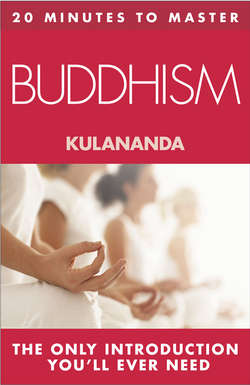20 MINUTES TO MASTER … BUDDHISM

Реклама. ООО «ЛитРес», ИНН: 7719571260.
Оглавление
Kulananda. 20 MINUTES TO MASTER … BUDDHISM
IN THE SAME SERIES
ABOUT THIS BOOK
CONTENTS
ACKNOWLEDGEMENTS
INTRODUCTION
CHAPTER 1. THE BUDDHA
References
CHAPTER 2. THE DHARMA
THE FOUR NOBLE TRUTHS
THE NOBLE EIGHTFOLD PATH
THE PATH OF VISION. Perfect Vision
The Three Marks of Conditioned Existence
THE PATH OF TRANSFORMATION. Perfect Emotion
Perfect Speech
Perfect Action
Perfect Livelihood
Perfect Effort
1. Preventing the Arising of Unarisen Unskilful Mental States
2. Eradicating Arisen Unskilful Mental States
3. Developing Unarisen Skilful Mental States
4. Maintaining Arisen Skilful Mental States
Perfect Awareness
PERFECT SAMADHI
References
CHAPTER 3. THE SANGHA
GOING FOR REFUGE
THE GROWTH AND DEVELOPMENT OF THE SANGHA
UNFOLDING THE RICHES OF THE ARYA SANGHA
FURTHER DEVELOPMENTS IN THE SANGHA
WOMEN IN BUDDHISM
SPIRITUAL FRIENDSHIP
References
CHAPTER 4. BUDDHIST ETHICS. KARMA
REBIRTH
THE FIVE PRECEPTS
1. I undertake the training principle to abstain from killing. With deeds of loving kindness, I purify my mind
2. I undertake the training principle to not take what has not been given. With open-handed generosity, I purify my mind
3. I undertake the training principle to abstain from sexual misconduct. With stillness, simplicity and contentment, I purify my body
4. I undertake the training principle to refrain from falsehood. With truthful communication I purify my speech
5. I undertake the training principle to abstain from intoxicants. With mindfulness, clear and radiant, I purify my mind
References
CHAPTER 5. MEDITATION
SAMATHA
THE MINDFULNESS OF BREATHING
THE DHYANAS
METTA BHAVANA
VIPASSANA
THE SIX-ELEMENT PRACTICE
VISUALIZATION PRACTICE
FORMLESS MEDITATIONS
DEVOTION AND RITUAL
References
CHAPTER 6. THE SPREAD AND DEVELOPMENT OF BUDDHISM
BUDDHISM TODAY
BUDDHISM IN THE WEST
References
INTRODUCTION
CHAPTER 1. THE DHARMA
THE FOUR NOBLE TRUTHS
THE NOBLE EIGHTFOLD PATH
THE PATH OF VISION. Perfect Vision
The Three Marks of Conditioned Existence
THE PATH OF TRANSFORMATION. Perfect Emotion
Perfect Speech
Perfect Action
Perfect Livelihood
Perfect Effort
1. Preventing the Arising of Unarisen Unskilful Mental States
2. Eradicating Arisen Unskilful Mental States
3. Developing Unarisen Skilful Mental States
4. Maintaining Arisen Skilful Mental States
Perfect Awareness
PERFECT SAMADHI
CHAPTER 2. THE SANGHA
GOING FOR REFUGE
THE GROWTH AND DEVELOPMENT OF THE SANGHA
UNFOLDING THE RICHES OF THE ARYA SANGHA
FURTHER DEVELOPMENTS IN THE SANGHA
WOMEN IN BUDDHISM
SPIRITUAL FRIENDSHIP
CHAPTER 3. BUDDHIST ETHICS. KARMA
REBIRTH
THE FIVE PRECEPTS
1. I undertake the training principle to abstain from killing. With deeds of loving kindness, I purify my mind
2. I undertake the training principle to not take what has not been given. With open-handed generosity, I purify my mind
3. I undertake the training principle to abstain from sexual misconduct. With stillness, simplicity and contentment, I purify my body
4. I undertake the training principle to refrain from falsehood. With truthful communication I purify my speech
5. I undertake the training principle to abstain from intoxicants. With mindfulness, clear and radiant, I purify my mind
CHAPTER 4. MEDITATION
THE MINDFULNESS OF BREATHING
THE DHYANAS
METTA BHAVANA
VIPASSANA
THE SIX-ELEMENT PRACTICE
VISUALIZATION PRACTICE
FORMLESS MEDITATIONS
DEVOTION AND RITUAL
COPYRIGHT
ABOUT THE PUBLISHER
Отрывок из книги
20 Minutes to Master Meditation
20 Minutes to Master Your Psychic Potential
.....
Dharma is a complex Sanskrit word (in Pali, the other main language of the ancient Indian Buddhist texts, it is ‘Dhamma’). It can mean law, or way, or truth. Here, it stands for all those teachings and practices which lead one towards Enlightenment. Over time, the Dharma which the Buddha taught came to be systematized. Repeated for hundreds of years in a purely oral tradition (the Buddha himself, like most of his kinsmen, was probably illiterate) the Dharma eventually formed the basis of an immense literary tradition, but at the start of it all there was just the Buddha, wandering about, trying to get people to see things more clearly, freely sharing his wisdom for the sake of all living beings, helping others to move towards the transcendental insight which he himself had attained.
Wherever he could, the Buddha tried to help people to see things as they really are, responding to every situation out of the depths of his wisdom and compassion. One day, for example, a woman called Kisa Gotami came to see him. Her child had died and she was distraught. Clutching the dead baby to her breast, she rushed about, looking for that medicine which would restore the child to life. Thrusting the dead child up at the Buddha, she wailed – ‘Please, please! Give me medicine for my baby!’
.....